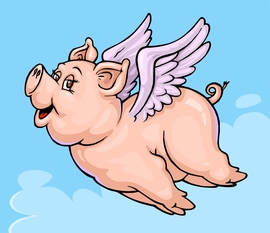
 Are you dealing with a major problem for which you can't imagine a solution and feel like giving up? It may be that you are looking at your crisis in a way that's preventing your opportunities from emerging. Perhaps you've been accepting what you think you cannot change instead of finding new ways to change what you cannot accept. With the synergy of best practices from a variety of disciplines, amazing solutions may appear. Who knows? One day even pigs might fly.
Are you dealing with a major problem for which you can't imagine a solution and feel like giving up? It may be that you are looking at your crisis in a way that's preventing your opportunities from emerging. Perhaps you've been accepting what you think you cannot change instead of finding new ways to change what you cannot accept. With the synergy of best practices from a variety of disciplines, amazing solutions may appear. Who knows? One day even pigs might fly.
A friend of mine once had an early work presentation to give the next day. She was very anxious about it because she was not a "morning person." I explained that when my volleyball team had early matches, our coach made us run a mile before the game. We then breezed through our competition because we were the most alert team. Desperate for any help, my friend got up early, went running before her talk, and when she finished, the audience sang her praises. This is an example of how a best practice in one arena can be applied to another to enhance results.
From extensive experience in multiple disciplines, I have found the approaches to solving problems differ significantly within each discipline. For instance, how you might handle a situation in business management could be very different in sports, the military, or education. By combining the best methods from all of these disciplines, including life coaching, I have come up with the following five role categories from which you can view your issue to help you achieve breakthroughs. They are: coach, scientist, counselor, cheerleader, and winner.
COACH In sports, players expect feedback from their coaches to help them improve. It is welcomed and rarely hurtful, even when it is critical, because athletes know that's how they are going to become the champions they want to be. Yet in the workplace, employees may get a performance evaluation only once or twice a year. They could have made useful changes much sooner if only the leader had let them know what they wanted as soon as he or she realized it. Asking for feedback and not being defensive when it is given is key to improving one's performance. Are you frequently giving yourself the honest coaching feedback you need about the problem you are facing as well as asking for other's inputs?
SCIENTIST As a scientist, you conduct experiments. Though trial and error you discover what works and what doesn't. You also know that discovering what doesn't work can be as valuable as what does. Thomas Edison failed, and failed, and failed in his effort to invent the first commercially practical incandescent light. Yet he framed his experiences as, "I have not failed. I just found 1,000 ways that won't work." Have you run your challenge through a thousand experiments before deciding you can't find a way to be successful?
COUNSELOR When our best efforts prove to be not good enough, we might seek out a counselor for help. Through a questioning process, a counselor can show us how our mental models keep us stuck and how to ask ourselves different questions. "Whose fault was it?" turns into "Where did the breakdown occur?" "I screwed up!" becomes "What can I do to improve?" "I can't" becomes "Do I want to?" or "How can I find a way?" Criticisms and mistakes become opportunities to learn. Are you counseling yourself to ask useful questions?
CHEERLEADER Do you talk to yourself in a positive way? When you have successes, do you spend ample time acknowledging them to help you develop winning as a pattern? Cheerleaders don't put you down when you mess up. They lift you up with words of encouragement. When you miss a point and your teammate says, "Shake it off, you'll get the next one," that's helpful cheerleading because it shifts your focus towards the goal instead of energizing what you don't want. Are you being a cheerleading teammate for yourself and associating with those who are cheerleaders for you?
WINNER When winners don't get the results they want, they don't blame others, feel unfairly criticized, or act like a victim (even if they really are). Instead, they review, assess, and mull over what is happening. Winners ask themselves how they might be contributing to their problem and what might be the logical, crazy, fun, or intuitive next step to take. They know they need to do something different and are not afraid to look bad to get good. Winners realize the road to their success is paved with humility.
These five role categories of coach, scientist, counselor, cheerleader, and winner are merely samples of perspectives you can apply to your issue. Best practices can be found in any field. For instance, following a mission, the U.S. Army conducts an after-action review (AAR) to assess what worked and what didn't. Are you reviewing your latest "mission" with similar scrutiny?
Next time you are confronted by a difficulty, step outside of your usual way of problem-solving, and consider it from another perspective. In the words of Wayne Dyer, "If you change the way you look at things, the things you look at change." By exploring alternatives to your challenges, your "no way" may soon turn into a "way to go!"
